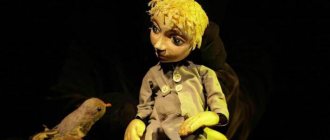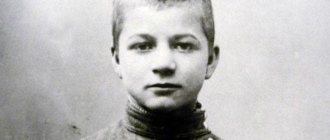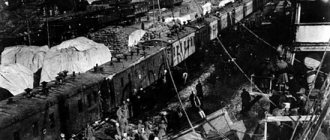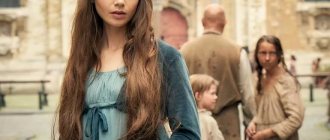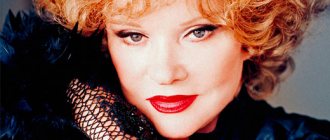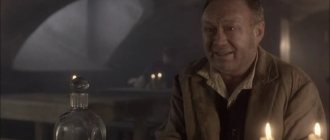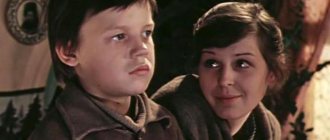The story “Nikita” - Andrey Platonov
Early in the morning, the mother left the yard for the field to work. But there was no father in the family; Father left long ago for his main job - the war - and never returned. Every day the mother expected the father to return, but he was still not there.
In the hut and in the entire yard, only Nikita, five years old, remained the owner. When leaving, his mother told him that Nikita should not burn down the yard, that he should collect eggs from the chickens that they laid in cubbyholes and under fences, that someone else’s rooster would not come into the yard and beat his rooster, and that he should eat milk and bread for lunch. table, and in the evening his mother will return and then feed him a hot dinner.
“Don’t spoil me, Nikitushka, you don’t have a father,” said the mother. “You’re smart now, but here all our goods are in the hut and in the yard.”
“I’m smart, the goods here are ours, but there’s no father,” Nikita said. - And you come quickly, mom, otherwise I’m afraid.
-What are you afraid of? The sun is shining in the sky, the fields are crowded all around, don’t be afraid, live peacefully alone...
“Yes, but the sun is far away,” answered Nikita, “and the cloud will cover it.”
Left alone, Nikita walked around the entire quiet hut - the upper room, then another room where there was a Russian stove, and went out into the hallway. Big fat flies were buzzing in the hallway, a spider was dozing in the corner in the middle of the web, a sparrow came on foot through the threshold and was looking for a grain in the living ground of the hut.
Nikita knew them all: sparrows, spiders, flies, and chickens in the yard; He was already tired of them, and they made him bored. He now wanted to know what he did not know. Therefore, Nikita went further into the yard and came to a barn, where an empty barrel stood in the dark. Someone probably lived in it, some small person; During the day he slept, and at night he went outside and ate bread, drank water and thought something, and the next morning he again hid in a barrel and slept.
“I know you, you live there,” Nikita, rising to his feet, said from above into the dark, echoing barrel, and then, in addition, knocked on it with his fist. - Get up, don't sleep, lazybones! What will you eat in winter? Go weed millet, they will give you a workday!
Nikita listened. It was quiet in the barrel. “He died, or what?” - Nikita thought. But her wooden tackle creaked in the barrel, and Nikita walked away from sin. He realized that it meant that the resident there had turned on his side or wanted to get up and chase Nikita.
But what was he like - the one who lived in a barrel? Nikita immediately imagined it in his mind. It was a small, but living person. His beard was long, it reached to the ground when he walked at night, and he accidentally swept away litter and straw with it, which left clean stitches in the barn.
My mother recently lost her scissors. He must have taken the scissors to trim his beard.
- Give me the scissors! - Nikita asked quietly. “Father will come back from the war and take everything away, he’s not afraid of you.” Give it back!
The barrel was silent. In the forest, far beyond the village, someone hooted, and a small resident in the barrel also answered him in a black, scary voice:
- I'm here!
Nikita ran out of the barn into the yard. The good sun was shining in the sky, the clouds did not cover it now, and Nikita looked in fear at the sun so that it would protect him.
- There's a resident living in a barrel! - Nikita said, looking at the sky.
The kind sun still shone in the sky and looked back at him with a warm face. Nikita saw that the sun looked like his deceased grandfather, who was always kind to him and smiled when he was alive and looked at him. Nikita thought that grandfather had now begun to live in the sun.
- Grandfather, where are you, do you live there? - Nikita asked. - Live there, and I’ll be here, I’m with my mother.
Behind the garden, in the thickets of burdocks and nettles, there was a well. Water had not been taken from it for a long time, because another well with good water had been dug on the collective farm.
In the depths of that blind well, in its underground darkness, bright water was visible with a clear sky and clouds walking under the sun. Nikita leaned over the frame of the well and asked:
-What are you doing there?
He thought that little water people lived there at the bottom. He knew what they were, he saw them in a dream and, waking up, wanted to catch them, but they ran away from him along the grass into the well, into their house. They were the size of a sparrow, but fat, hairless, wet and harmful; they must have wanted to drink Nikita's eyes while he was sleeping.
- I give you! - Nikita said into the well. - Why do you live here?
The water in the well suddenly became cloudy, and from there someone slurped its mouth. Nikita opened his mouth to scream, but his voice did not sound out loud, he was numb with fear; his heart only trembled and stopped.
“The giant and his children still live here!” - Nikita understood.
- Grandfather! - Looking at the sun, he shouted out loud. - Grandfather, are you there? - And Nikita ran back to the house.
At the barn he came to his senses. Two earthen holes ran under the fence wall of the barn. Secret residents also lived there. Who were they? - Maybe snakes! “They will crawl out at night, crawl into the hut and sting the mother in her sleep, and the mother will die.”
Nikita ran home quickly, took two pieces of bread from the table there and brought them. He placed bread at each hole and said to the snakes:
- Snakes, eat bread, and don’t come to us at night.
Nikita looked around. There was an old stump in the garden. Looking at it, Nikita saw that it was the head of a man. The stump had eyes, a nose and a mouth, and the stump silently smiled at Nikita.
- Do you live here too? - asked the boy. “Come out to our village and you’ll plow the land.”
Stump grunted in response, and his face became angry.
- Don’t get out, don’t, it’s better to live there! - Nikita said, scared.
The whole village was quiet now, you couldn’t hear anyone. Mother is far away in the field, you won’t have time to reach her. Nikita walked away from the angry stump into the shadow of the hut. It wasn’t scary there; my mother had recently been home there. It was now hot in the hut. Nikita wanted to drink the milk that his mother left him, but looking at the table, he noticed that the table was also a person, only on four legs, and he had no arms.
Nikita went out into the hallway onto the porch. In the distance, behind the vegetable garden and well, there was an old bathhouse. It was heated black, and my mother said that my grandfather loved to swim in it when he was still alive.
The bathhouse was old and all mossy, a boring hut.
“This is our grandmother, she didn’t die, she became a hut! - Nikita thought in fear about his grandfather’s bathhouse. “Look, she lives for herself, there she has a head - it’s not a pipe, but a head - and a gap-toothed mouth in the head.” She is a bathhouse on purpose, but in truth she is also a person! I see!"
Someone else's rooster entered the yard from the street. He was similar in face to the familiar thin shepherd with a beard, who drowned in the river in the spring when he wanted to swim across it in the flood to go for a walk to a wedding in a strange village.
Nikita decided that the shepherd did not want to be dead and became a rooster; This means that this rooster is also a person, only secret. There are people everywhere, but they don’t seem like people.
Nikita leaned towards the yellow flower. Who was he? Peering at the flower, Nikita saw how gradually a human expression appeared in his round face, and now small eyes, a nose and an open, wet mouth, smelling of living breath, became visible.
“I thought you really were a color!” - Nikita said. “Let me see what’s inside you, do you have guts?”
Nikita broke the stem - the body of the flower - and saw milk in it.
“You were a little child, you sucked your mother!” - Nikita was surprised.
He went to the old bathhouse.
- Grandmother! - Nikita told her quietly.
But the grandmother’s gap-toothed face grinned angrily at him, as if he were a stranger.
“You are not a grandmother, you are different!” - Nikita thought.
The fence stakes looked at Nikita like the faces of many unknown people. And each face was unfamiliar and did not like him: one grinned angrily, another angrily thought something about Nikita, and the third stake leaned its withered arms-branches on the fence and was about to crawl out of the fence altogether to chase Nikita.
- Why do you live here? - Nikita said. - This is our yard!
But unfamiliar, angry faces of people from everywhere looked motionlessly and vigilantly at Nikita. He looked at the mugs - they must be kind. However, even the mugs now gloomily shook their large heads and did not like him.
Nikita lay down on the ground and pressed his face to her. Voices were buzzing inside the earth; many people must have lived there in close darkness, and you could hear them struggling with their hands to get out into the light of the sun. Nikita stood up in fear that someone was living everywhere and strange eyes were looking at him from everywhere, and whoever did not see him wanted to come out to him from underground, from a hole, from the black barn. He turned to the hut. The hut looked at him like an old woman passing by from a distant village, and whispered to him: “Uh-oh, good-for-nothings, they brought you into the world - chewing wheat bread for nothing.”
- Mom, go home! - Nikita asked his distant mother. - Let them write down half of your workday. Strangers have come into our yard and are living. Drive them away!
The mother did not hear her son. Nikita went behind the barn, he wanted to see if the stump-head was coming out of the ground; The stump has a big mouth, it will eat all the cabbage in the garden, then what will the mother use to cook cabbage soup in the winter?
Nikita timidly looked at the stump in the garden from afar. A gloomy, unsociable face, overgrown with wrinkled bark, looked at Nikita with unblinking eyes.
And far away someone, from the forest behind the village, shouted loudly:
- Maxim, where are you?
- In the ground! - the stump-head responded dully.
Nikita turned around to run to his mother in the field, but fell. He fell ill with fear; His legs now became like strangers and did not obey him. Then he crawled on his stomach, as if he was still small and could not walk.
- Grandfather! - Nikita whispered and looked at the kind sun in the sky.
The cloud obscured the light, and the sun was no longer visible.
- Grandfather, come live with us again!
Grandfather the sun appeared from behind a cloud, as if the grandfather had immediately removed the dark shadow from his face to see his weakened grandson crawling on the ground. Grandfather was now looking at him; Nikita thought that his grandfather saw him, got to his feet and ran to his mother.
He ran for a long time. He ran along the dusty empty road the entire village street, then got tired and sat down in the shade of a barn on the outskirts.
Nikita sat down for a while. But he accidentally lowered his head to the ground, fell asleep and woke up only in the evening. The new shepherd was driving the collective farm herd. Nikita went further, into the field to see his mother, but the shepherd told him that it was already late and Nikita’s mother had long left the field for the courtyard.
At home Nikita saw his mother. She sat at the table and looked, without taking her eyes off, at the old soldier who was eating bread and drinking milk.
The soldier looked at Nikita, then got up from the bench and took him into his arms. The soldier smelled of warmth, something kind and peaceful, bread and earth. Nikita became shy and silent.
“Hello, Nikita,” said the soldier. “You have forgotten me a long time ago, you were still a baby when I kissed you and went to war.” But I remember you, I died and remembered you.
“It’s your father who came home, Nikitushka,” said the mother and wiped the tears from her face with her apron.
Nikita examined his father—his face, his hands, the medal on his chest—and touched the clear buttons on his shirt.
“Won’t you leave us again?”
“No,” said the father. “Now I’ll be with you forever.” We have destroyed the enemy, it’s time to think about you and your mother...
The next morning, Nikita went out into the yard and said out loud to everyone who lived in the yard - and the burdocks, and the barn, and the stakes in the fence, and the stump-head in the garden, and grandfather’s bathhouse:
- Father came to us. He will live with us forever.
Everyone in the courtyard was silent; Apparently, everyone became afraid of their father-soldier, and it was quiet underground, no one was struggling from there out into the light.
- Come to me, Nikita. Who are you talking to there?
Father was in the barn. He examined and tried with his hands axes, shovels, a saw, a plane, a vice, a workbench and various pieces of iron that were on the farm.
Having gotten rid of it, the father took Nikita by the hand and walked with him around the yard, looking at where, what and how it stood, what was intact and what was rotten, what was needed and what was not.
Nikita, just like yesterday, looked into the face of every creature in the yard, but now he did not see a secret person in any of them; there was no eye, no nose, no mouth, no evil life in anyone. The stakes in the fences were withered thick sticks, blind and dead, and grandfather's bathhouse was a rotting house, sinking into the ground from old age. Nikita even felt sorry for his grandfather’s bathhouse now, that she was dying and would never exist again.
My father went to the barn to get an ax and began chopping a dilapidated stump in the garden for firewood. The stump immediately began to fall apart, it peeled away completely, and its dry ashes rose like smoke from under my father’s ax.
When the stump-head was gone, Nikita said to his father:
- And you weren’t there, he spoke the words, he was alive. Under the ground he has a belly and legs.
The father took his son home to the hut.
“No, he died a long time ago,” said the father. “You want to make everyone alive, because you have a good heart.” For you, the stone is alive, and the deceased grandmother lives again on the moon.
- And grandfather is in the sun! - Nikita said.
During the day, my father planed boards in the barn to re-lay the floor in the hut, and he also gave Nikita a job - straightening crooked nails with a hammer.
Nikita eagerly, like a big man, began to work with a hammer. When he straightened the first nail, he saw in it a small, kind man, smiling at him from under his iron cap. He showed it to his father and told him:
- Why were the others evil - and the burdock was evil, and the stump-head, and the water people, and this good little man?
The father stroked his son's blond hair and answered him:
- You invented those, Nikita, they don’t exist, they are fragile, that’s why they are evil. And you yourself worked hard on this nail-man, he is kind.
Nikita thought about it.
“Let’s all work hard, and everyone will be alive.”
“Come on, son,” the father agreed. - Come on, good Keith.
My father, remembering Nikita during the war, always called him “good Keith” to himself. The father knew that Nikita was born kind to him and would remain kind throughout his long life.
Platonov Andrey Nikita
In the hut and in the entire yard, only Nikita, five years old, remained the owner. When leaving, his mother ordered him not to burn the yard, so that he collected eggs from the chickens that they laid in the nooks and under the fences, so that someone else’s rooster did not come into the yard and beat his rooster, and so that he ate milk and bread for lunch. table, and in the evening his mother will return and then feed him a hot dinner.
-What are you afraid of? The sun is shining in the sky, the fields are crowded all around, don’t be afraid, live peacefully alone.
Nikita knew them all: sparrows, spiders, flies, and chickens in the yard; He was already tired of them, and they made him bored. He now wanted to know what he did not know. Therefore, Nikita went further into the yard and came to the barn, where an empty barrel stood in the dark. Someone probably lived in it, some small person: during the day he slept, and at night he went out and ate bread, drank water and thought something, and in the morning he hid in the barrel again and slept.
The barrel was silent. In the forest, far beyond the village, someone hooted, and a small resident in the barrel also answered him in a black, scary voice.
Nikita ran out of the barn into the yard. The good sun was shining in the sky, the clouds did not cover it now, and Nikita looked in fear at the sun so that it would protect him.
The kind sun still shone in the sky and looked back at him with a warm face. Nikita saw that the sun looked like his deceased grandfather, who was always kind to him and smiled when he was alive and looked at him. Nikita thought that grandfather had now begun to live in the sun.
Behind the garden, in the thickets of burdocks and nettles, there was a well. Water had not been taken from it for a long time, because another well with good water had been dug on the collective farm.
In the depths of that blind well, in its underground darkness, bright water with a clear sky and clouds walking under the sun was visible. Nikita leaned over the frame of the well and asked:
He thought that little water people lived there at the bottom. He knew what they were, he saw them in a dream and, waking up, wanted to catch them, but they ran away from him along the grass into the well, into their house. They were the size of a sparrow, but fat, hairless, wet and harmful; they must have wanted to drink Nikita's eyes while he was sleeping.
